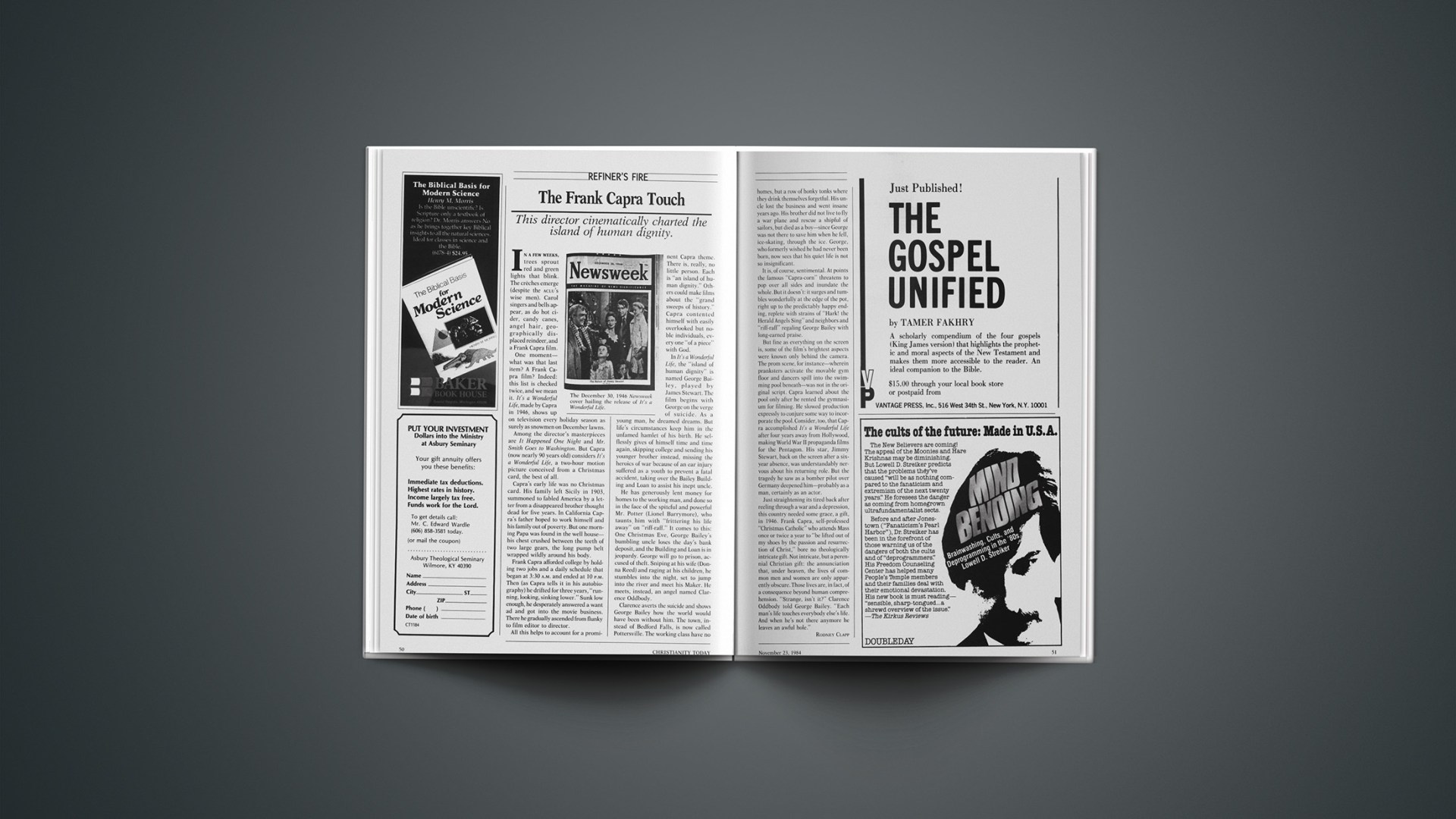In a few weeks, trees sprout red and green lights that blink. The crèches emerge (despite the ACLU’s wise men). Carol singers and bells appear, as do hot cider, candy canes, angel hair, geographically displaced reindeer, and a Frank Capra film.
One moment—what was that last item? A Frank Capra film? Indeed: this list is checked twice, and we mean it. It’s a Wonderful Life, made by Capra in 1946, shows up on television every holiday season as surely as snowmen on December lawns.
Among the director’s masterpieces are It Happened One Night and Mr. Smith Goes to Washington. But Capra (now nearly 90 years old) considers It’s a Wonderful Life, a two-hour motion picture conceived from a Christmas card, the best of all.
Capra’s early life was no Christmas card. His family left Sicily in 1903, summoned to fabled America by a letter from a disappeared brother thought dead for five years. In California Capra’s father hoped to work himself and his family out of poverty. But one morning Papa was found in the well house—his chest crushed between the teeth of two large gears, the long pump belt wrapped wildly around his body.
Frank Capra afforded college by holding two jobs and a daily schedule that began at 3:30 A.M. and ended at 10 P.M. Then (as Capra tells it in his autobiography) he drifted for three years, “running, looking, sinking lower.” Sunk low enough, he desperately answered a want ad and got into the movie business. There he gradually ascended from flunky to film editor to director.
All this helps to account for a prominent Capra theme. There is, really, no little person. Each is “an island of human dignity.” Others could make films about the “grand sweeps of history.” Capra contented himself with easily overlooked but noble individuals, every one “of a piece” with God.
In It’s a Wonderful Life, the “island of human dignity” is named George Bailey, played by James Stewart. The film begins with George on the verge of suicide. As a young man, he dreamed dreams. But life’s circumstances keep him in the unfamed hamlet of his birth. He selflessly gives of himself time and time again, skipping college and sending his younger brother instead, missing the heroics of war because of an ear injury suffered as a youth to prevent a fatal accident, taking over the Bailey Building and Loan to assist his inept uncle.
He has generously lent money for homes to the working man, and done so in the face of the spiteful and powerful Mr. Potter (Lionel Barrymore), who taunts him with “frittering his life away” on “riff-raff.” It comes to this: One Christmas Eve, George Bailey’s bumbling uncle loses the day’s bank deposit, and the Building and Loan is in jeopardy. George will go to prison, accused of theft. Sniping at his wife (Donna Reed) and raging at his children, he stumbles into the night, set to jump into the river and meet his Maker. He meets, instead, an angel named Clarence Oddbody.
Clarence averts the suicide and shows George Bailey how the world would have been without him. The town, instead of Bedford Falls, is now called Pottersville. The working class have no homes, but a row of honky tonks where they drink themselves forgetful. His uncle lost the business and went insane years ago. His brother did not live to fly a war plane and rescue a shipful of sailors, but died as a boy—since George was not there to save him when he fell, ice-skating, through the ice. George, who formerly wished he had never been born, now sees that his quiet life is not so insignificant.
It is, of course, sentimental. At points the famous “Capra-corn” threatens to pop over all sides and inundate the whole. But it doesn’t: it surges and tumbles wonderfully at the edge of the pot, right up to the predictably happy ending, replete with strains of “Hark! the Herald Angels Sing” and neighbors and “riff-raff” regaling George Bailey with long-earned praise.
But fine as everything on the screen is, some of the film’s brightest aspects were known only behind the camera. The prom scene, for instance—wherein pranksters activate the movable gym floor and dancers spill into the swimming pool beneath—was not in the original script. Capra learned about the pool only after he rented the gymnasium for filming. He slowed production expressly to conjure some way to incorporate the pool. Consider, too, that Capra accomplished It’s a Wonderful Life after four years away from Hollywood, making World War II propaganda films for the Pentagon. His star, Jimmy Stewart, back on the screen after a six-year absence, was understandably nervous about his returning role. But the tragedy he saw as a bomber pilot over Germany deepened him—probably as a man, certainly as an actor.
Just straightening its tired back after reeling through a war and a depression, this country needed some grace, a gift, in 1946. Frank Capra, self-professed “Christmas Catholic” who attends Mass once or twice a year to “be lifted out of my shoes by the passion and resurrection of Christ,” bore no theologically intricate gift. Not intricate, but a perennial Christian gift: the annunciation that, under heaven, the lives of common men and women are only apparently obscure. Those lives are, in fact, of a consequence beyond human comprehension. “Strange, isn’t it?” Clarence Oddbody told George Bailey. “Each man’s life touches everybody else’s life. And when he’s not there anymore he leaves an awful hole.”










